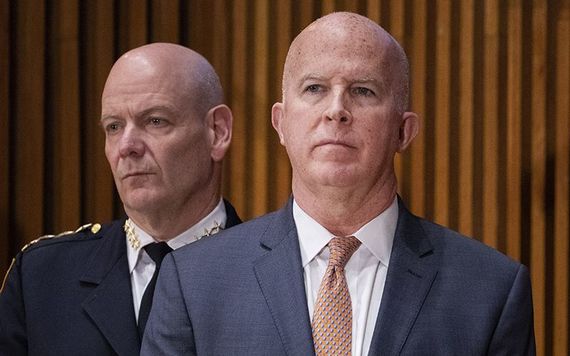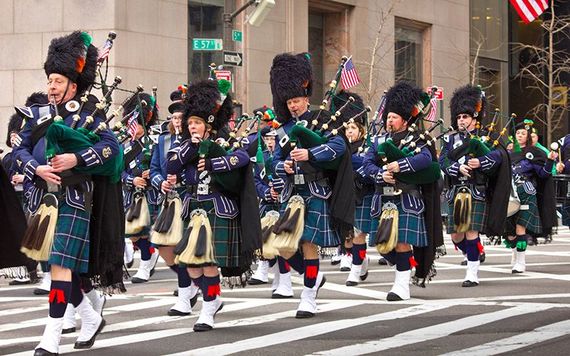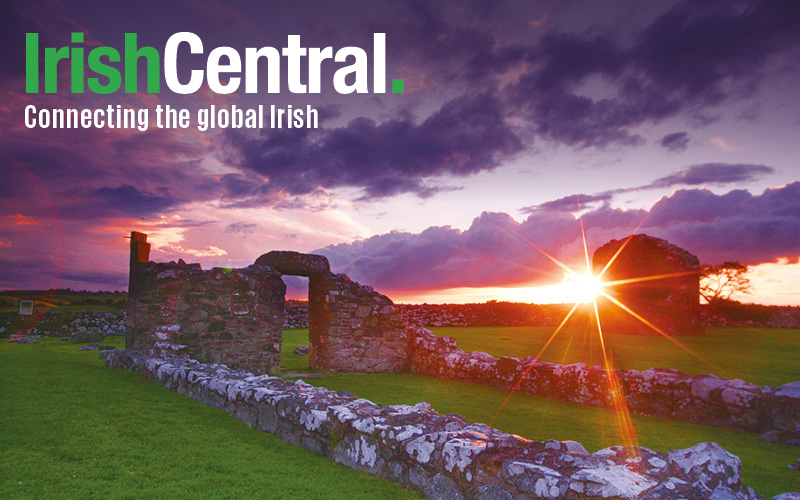Terence Monahan is a life-long, intensely proud cop and, since last year, the highest ranking NYPD officer in uniform thanks to his promotion as chief of department. Monahan speaks about his career which started out on the mean streets of the Bronx, and what it takes to keep New York safe
There's a large, old photograph of the 41st Precinct station house in the South Bronx that rests on the desk of NYPD Chief of Department Terence Monahan. He began his policing career at the four-one, also known as Fort Apache, back in 1982 when crime was pretty much out of control, and he relished every minute of his time in one of the city’s most dangerous areas.
Monahan, a third generation member of the NYPD from the Bronx known as Terry, didn’t dare imagine that one day he’d have a suite of offices high atop Police Plaza in downtown Manhattan, serving as the force’s chief of department – the top ranking uniformed member of New York’s Finest who oversees a staff of 40,000 uniformed and civilian NYPD members. Though Monahan is a core member of the top brass whose strategies have resulted in historic drops in crime, his heart remains on the streets.
“I still patrol when I can but it’s tough to get out as much as I would like to. When I can I love to go out, especially to the Bronx,” Monahan said during an interview with the Irish Voice last week.

NYPD Chief of Department Terence Monahan and Commissioner James O'Neill.
Monahan, 58, is a cop’s cop, reeling off stories about his time in the NYPD with delight -- and there are many stories. They actually begin when Monahan was a child in the Parkchester section of the Bronx, the grandson of an Irish immigrant who died in 1923. “Unfortunately we lost a lot of our Irish family history with his death,” he says.
His maternal grandfather joined the 41st Precinct in 1927, and Monahan’s father also joined the force in 1946, right after serving in World War II. Even his brother, 10 years older, was a member of the NYPD. Monahan went to the local Catholic schools with friends who, like him, couldn’t wait to put the blue uniform on.
“I heard all about the NYPD from my dad, and my brother would come home with lots of stories. It’s all I ever wanted to do. My mother wanted to push me towards the FBI or something like that, and I said, ‘Yeah, sure,’ but that was never gonna happen,” he laughs.
In January of 1982, Monahan and nine of his buddies from the neighborhood, many of them Irish, joined the NYPD. They’d ride the train together from Parkchester to the Police Academy, and through the years some would serve together in various precincts.
Read more: NYPD in action - Irish photographer spent two years embedded to make new book come to life
It’s easy to see why Monahan’s mother wanted her son to pursue another line of work. New York is the country’s safest big city these days, but back then it was anything but. Though the Bronx wasn’t quite burning when Monahan joined the 41st, crime was rampant and gun violence was a way of life.
“It was crazy. It wasn’t safe at all,” Monahan recalls of his early days at Fort Apache. “At that point, the neighborhood all around the station house had been burned down. There was nothing but vacant lots all over the place. The precinct was the only building standing.” Driving around the Hunts Point section, cops would encounter prostitutes standing on most corners. There were shootings every single day. Drugs were as easy to buy as a cup of coffee. Monahan remembers one gruesome story involving a scorned teenager who got his hands on a machine gun.
“I walked into an apartment and a woman was on the floor, her head blown off, a dog chewing on her body … then behind us, a guy gets up and his whole face is blown off. It was like a zombie,” he says.
“Turns out that a 15-year-old girl broke up with her 15-year-old boyfriend. He came to her apartment with a machine gun and lost control of it, and just riddled everyone there. Walking into stuff like that, shootings and carnage, was not uncommon back then.”
Monahan’s career was progressing nicely at the NYPD. He transferred to a plainclothes unit and then narcotics, and after five years on the force, he was promoted to sergeant. He moved to the 46th Precinct, also in the Bronx and the one he calls his favorite, doing two stints including one as commanding officer from 1996-1999.
Monahan even appeared on an episode of the popular TV show Cops. Producers worked with the NYPD on only two occasions, and the chief proudly boasts that he – and his very distinctive Bronx accent – featured on one of them.
“The episode started with my voiceover, and then you hear the music ‘Bad boys, bad boys,’” he laughs. “We were doing a search warrant in Washington Heights and the TV crew was with the emergency service.
“We get upstairs and a pit bull comes right at me…the next thing two cops shot the dog. So the cameras come rushing up because they heard the shots fired. We actually ended up seizing 10 kilos of cocaine. I have to say it was fun!”
The promotions kept coming, which is not surprising given Monahan’s track record. The chief has been honored 28 times for excellent police duty and eight times for meritorious police duty. Monahan marvels at how the city has changed from his Fort Apache days.
“Back in the 1980s, the murder rate was hovering around 1,500-2,000. Last year it was 295. That’s just incredible,” he says.
“When I started you couldn’t drive a block without shots being fired. Now someone gets killed you get chiefs and captains and inspectors showing up on the scene. When I was a patrol sergeant and someone got killed, we did a quick report, a detective came and that was it, we were done. The precision that we use now wasn’t happening back then because there was so much violence.”
Monahan has worked closely with his friend, NYPD Commissioner James O’Neill – they’ve known each other for years, and their sons used to play hockey against each other -- so it wasn’t surprising when he was tapped for the chief of department promotion at the end of 2017 after the retirement of Carlos Gomez. The appointment became official at the start of last year.

NYPD Commissioner James O'Neill.
“I spend a lot of time going to meetings and events, going to medal days for the cops, meeting with lots of community groups and really just speaking with cops about what’s going on in their precincts, and what they need to make things work,” Monahan says.
The neighborhood policing program the NYPD put in place in 2014 has had a dramatic effect on crime reduction. Crime had gone down consistently since 1994 but “reached a bubble,” Monahan says and wasn’t shifting.
Neighborhood policing – having cops work hand in hand with the communities they serve -- once again made the numbers decrease. From 2014 to last year there was a 30 percent drop in shootings, and homicides were down another 10 percent.
“We are not an occupying force. We are part of the city. You create bonds by talking to people. The best cops are the ones who have the ability to speak to people and create relationships. That is how we get information, and that is how we keep people safe,” he says.
The NYPD’s community involvement is especially essential when cases of police shootings make headline news. “One incident anywhere in the country, it doesn’t matter where ripples back. So if I don’t have relationships with the people in my neighborhood they’re going to be looking at me negatively. Looking at the cops negatively. We are all human, and we need communities to see us as individuals the very same as them,” Monahan maintains.
Demonizing immigrants is not and will never be NYPD policy – Monahan shakes his head in disgust at the very notion. His force, after all, is majority minority, with 28 percent of its members Hispanic, 15 percent African American, Asians, and other groups eight percent, and whites at 49 percent.
“I’ve worked in minority communities all my career. If immigrants are afraid of you, that you’ll take them away because of their status, then we are not doing our job. We are an immigrant city. Our communities have to trust us,” he says.
The NYPD is a “top-down” organization according to Monahan, with decisions made in Police Plaza but heavily reliant on input from officers on the ground.
“I don’t know what’s best for, say, 125th Street and Lexington than the cop who is out there every single day talking to people in that community, so we give them discretion. We want them to make decisions about their neighborhood and take ownership. When crime goes down in that neighborhood they feel they’ve accomplished something, and that’s what we want, for our cops to feel a sense of achievement,” Monahan says.
Monahan is an early riser – up at 4 a.m. and in the office by six. There are constant meetings and analysis during the day, usually events every night, and he’s lucky if he’s in bed by 10 p.m. “It’s fun. I love it. You know, you do meet all kinds of interesting people,” he laughs.
Married with three grown children, two sons, and a daughter, it appears as if there won’t be a fourth generation Monahan in the NYPD. “That’s okay,” says their dad, who enjoys sports and fantasy football when he’s off the clock. “They are doing good and they’re happy doing their thing.”
The best part of his job by far, Monahan says, is hanging with the cops. “I love interacting with them, talking with them about what they do. They are so, so good. These men and women have gone out there and transformed the city,” he adds.
Read more: Tragic NYPD Irish cop who wrote one of Ireland’s best-known ballads
The darkest days come when a cop loses his or her life in the line of duty. New Yorkers watched with sorrow as Detective Brian Simonsen was buried after being killed by friendly fire during a Queens robbery last month.
“It’s the worst. The shootings stay with you forever. You get the phone call and at first it comes in piecemeal, so you’re hoping that it won’t be so bad, that maybe the cop was only shot in the arm or something,” Monahan says.
“It’s our solemn vow never to forget and that’s the truth. The families are amazing people. We stick together.”
Monahan knew well the beloved Detective Steven McDonald, shot on the job in 1986 and paralyzed from the neck down. Steven died in January of 2017, and his only son, Conor, is a sergeant with the NYPD who works on Monahan’s team.
“If Steven isn’t a saint then no one will be a saint. You would always see him at every event. He was a reminder of the dangers of our job,” Monahan says.
“He was an incredible inspiration. He cared so much about the men and women of this agency. He was our voice.”
The city that never sleeps is well served by a force that is also constantly awake. And preparations for the annual St. Patrick’s Day parade are well underway. They actually start each year the day after the event.

New York St. Patrick's Day Parade, on Fifth Avenue.
“We look at everything that happened on the day, what did we maybe miss, how can we do better. We speak with the parade organizers. And every terror incident that’s happened everywhere in the world, we look at those and learn how we have to adjust too,” Monahan says.
“We just want to encourage everyone to go to the parade and have a good time. There will be a cop within an inch of just about anywhere on the parade route so if people see something that makes them uncomfortable, then tell us and we will investigate.”
Monahan was honored last month by the NYPD Emerald Society as Irishman of the Year. Hundreds of his colleagues gathered at a Long Island catering hall to celebrate.
“It was a blast. I had the best time. I’ve been a member of the Emeralds since I first joined the force. And I’ve always marched in the parade except for when I had to work,” he said.
This year he’ll be marking the Irish holiday from halfway around the world in Dubai, where he’s committed to speak at a conference.
“I tried to make the days work so that I could march, but I couldn’t do it. I’ll be there in spirit though!” Monahan said.
Read more: NYPD -- No Irish Need Apply seems to be the new reality




Comments